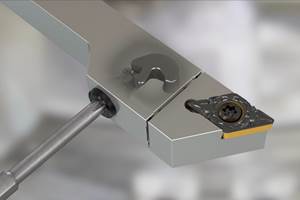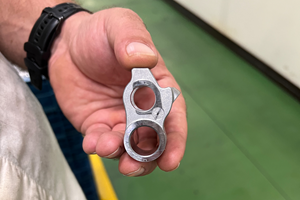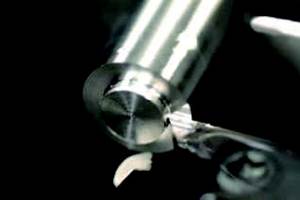Milling System Puts Productivity In Fast Lane
When this company won a contract to machine automotive parts for a customer, they were faced with the need for a milling tool that could meet tighter cycle times, enable machining centers to perform multiple tasks, maximize the life of milling tools and reduce tool inventory.
Share





Nationwide Precision Products (Rochester, New York) specializes in the precision machining of complex castings and components. When the company won a contract to machine automotive parts for a customer, NPP was faced with the need for a milling tool that could meet tighter cycle times, enable machining centers to perform multiple tasks, maximize the life of milling tools and reduce tool inventory.
The company selected the Fix Perfect cast iron face milling system from Kennametal. Depending upon the application, this cutting tool can accommodate eight-edged carbide inserts or KYON 3500 ceramic cutting tools for high speed applications and high metal removal rates. To produce higher feed rates, the inserts are tangentially positioned in the cutter head at 20 degrees or 0 degrees.
"We tested a lot of milling systems on our shop floor, and none was better than Fix Perfect," says Dave Merritt, NPP's director of manufacturing engineering. "The Kennametal cutting tool lasted longer and performed better than competing products. KYON 3500 ceramic inserts cut metal like a hot knife going through butter. With Fix Perfect, we have accelerated cycle times by about 45 percent and are saving $100,000 in labor costs annually."
Since March 2000, NPP has been successfully using the Fix Perfect cast iron face milling system with KYON 3500 ceramic inserts in the rough and finish milling of various parts for a manufacturer of truck and automobile axles.
"NPP has to mill many parts in short time frames," says Tom Van Order, a Kennametal field sales representative. "Before NPP agreed to purchase Fix Perfect, we worked very hard to simulate production line conditions during the testing phase. During testing, Fix Perfect exceeded the customer's expectations, and it continues to do so on the shop floor."
Each Fix Perfect cutting insert has eight cutting edges that each provide about 110 minutes of tool life, or 880 minutes of tool life per insert for NPP's applications—much longer than the average useful life of similar tools. Each insert, which is secured to the cutter head by a clamping screw, cuts the metal surface at programmed intervals.
"The difference is unbelievable," says Mr. Merritt. "We were using solid carbide end mills that lasted for a few days on a particular application, but the Fix Perfect system lasts us several weeks, which allows us to fulfill the objectives we had at the beginning of our search for a milling system." Those goals included meeting tight cycle times, using machining centers to perform multiple tasks, maximizing the tool life of the inserts and reducing tool inventory.
The Fix Perfect system can be used in horizontal and vertical machining centers. The inserts can reach speeds of 3,000 rpm and require no lubricants, because the cutting tool speed is fast enough to create the friction required to move the correct amount of metal.
One of the parts that NPP mills with the Fix Perfect system is an inner axle differential case made of medium tensile ductile iron (SAE #4012) that is welded together to house "spider gears" in motor vehicles. The differential case is milled on a Mori Seiki SH-403 horizontal machining center, which is a 25 hp 40-taper machine. The milled surfaces are four trapezoid-shaped ridges that protrude from the ring of the differential case. Each metal protrusion is milled by a coarse pitch cutter head, which has a 3-inch diameter and contains 8 KYON 3500 ceramic cutting tools.
"The performance of Fix Perfect in this particular application shows that the product works just as well in ductile iron applications as it does in cast iron ones," says Tim Marshall, product manager for the Fix Perfect line. "Generally, ductile iron is more flexible than cast iron. Nevertheless, ductile holds up extremely well when milled by fast-moving Fix Perfect cutting tools."
NPP is also using the cutting tools effectively in milling the interior perimeter of a cast iron housing cover (SAE #4012) that is used to protect rear axle tractor-trailer gears from overheating and loss of lubrication.
"The effectiveness of this application shows that Fix Perfect performs equally well in horizontal and vertical machining centers," says Mr. Van Order.
The pumpkin-shaped housing cover is finish milled on a Mori Seiki SH-403 vertical milling center, which is almost identical to the machine that mills the differential case. As in the horizontal milling application, the cutter head with KYON 3500 ceramic cutting inserts moves while the metal remains stationary as it is being milled.
"With Fix Perfect, our productivity on milling the housing covers has improved dramatically," says Mr. Merritt.
Besides using Kennametal's Fix Perfect to mill the differential case and housing cover, NPP is milling a carrier housing and a bearing cap that is bolted to the housing.
"The Fix Perfect cast iron milling system has exceeded our expectations," says Mr. Merritt. "It's clearly a product that does what the manufacturer says it will do—and more."
Mr. Merritt is so pleased with Fix Perfect that he has invited Kennametal to field-test any new metalcutting and machining products that the company invents.
Related Content
Quick-Change Tool Heads Reduce Setup on Swiss-Type Turning Centers
This new quick-change tooling system enables shops to get more production from their Swiss turning centers through reduced tool setup time and matches the performance of a solid tool.
Read MoreCustom PCD Tools Extend Shop’s Tool Life Upward of Ten Times
Adopting PCD tooling has extended FT Precision’s tool life from days to months — and the test drill is still going strong.
Read MoreHigh-Feed Machining Dominates Cutting Tool Event
At its New Product Rollout, Ingersoll showcased a number of options for high-feed machining, demonstrating the strategy’s growing footprint in the industry.
Read MoreToolpath Improves Chip Management for Swiss-Type Lathes
This simple change to a Swiss-type turning machine’s toolpath can dramatically improve its ability to manage chips.
Read MoreRead Next
Setting Up the Building Blocks for a Digital Factory
Woodward Inc. spent over a year developing an API to connect machines to its digital factory. Caron Engineering’s MiConnect has cut most of this process while also granting the shop greater access to machine information.
Read More5 Rules of Thumb for Buying CNC Machine Tools
Use these tips to carefully plan your machine tool purchases and to avoid regretting your decision later.
Read MoreBuilding Out a Foundation for Student Machinists
Autodesk and Haas have teamed up to produce an introductory course for students that covers the basics of CAD, CAM and CNC while providing them with a portfolio part.
Read More











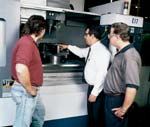
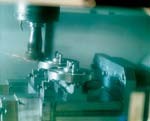
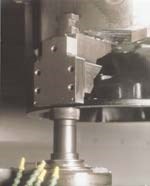




.png;maxWidth=300;quality=90)










